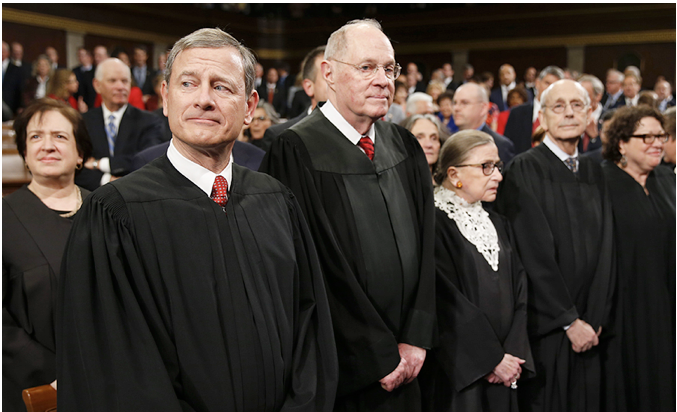CommentsGELFAND’S WORLD--The senate Democrats are right to filibuster Trump's Supreme Court appointment. There are plenty of reasons, including the appointee's judicial philosophy. But there is one overriding reason, the one that Democrats haven't been explaining very well. Let's give it a try.
The Republicans in the U.S. Senate made it clear from the moment of Barack Obama's inauguration that they intended to obstruct everything that the new president tried to do. They would do everything in their power to make Obama into a failure, and in so doing, cause him to fail to be reelected. Senator Mitch McConnell made this explicit. The Republicans failed in preventing Obama's reelection, but the policy of obstruction continued.
In 2016, Supreme Court Justice Antonin Scalia died. Under the Constitution, the president is empowered to appoint Supreme Court justices, and the appointees take office provided that they receive the consent of the Senate. McConnell and his colleagues said that they would not consent to any Obama appointee. They were willing to stall until a new president took office.
In effect, the senate Republicans established an 8 member Supreme Court as national policy. That policy was intended to continue until the United States got a president that the senate Republicans liked. They made various unimpressive arguments to explain the new line, but in actuality it was a raw power grab.
As reprehensible as this tactic was, it wasn't all that surprising. More than a decade ago, economist and political analyst Paul Krugman had been warning the American people that the Republican Party had become something different from a classical conservative party. It was, he pointed out, a revolutionary force that was willing to break any rule and violate any precedent.
The refusal by senate Republicans even to hold hearings on Obama's nomination was more than just a routine parliamentary maneuver. It is what historians and political analysts would refer to as a provocation. In the world of diplomacy, a provocation is something that the opposition must respond to or, in failing to do so, lose face and influence. A provocation is intended to reduce one's opponent's power and simultaneously to inflict humiliation. That's the course of conduct that the senate Republicans followed throughout Obama's presidency.
A policy that blocks the right of a president to nominate a justice to an open court seat certainly is a provocation. Notice that there have been fights over Supreme Court appointments in the past, the most notable being that of Robert Bork. But the Bork nomination was handled according to the normal procedures of the Senate. Bork did not gain a seat on the court, but another controversial appointee, Clarence Thomas, was confirmed.
The Republican response to Obama's nomination took obstruction to a new level. It was a provocation that must be answered if the Democrats are to maintain any semblance of credibility.
The proper approach is for the Democrats in the U.S. Senate to make clear that once the Republicans established the 8-justice doctrine, even for just the last year of Obama's second term, the Democrats have had no choice but to respond in kind. The Democrats should make clear that there will be no Trump appointees to the Supreme Court confirmed during this four year term. That would not be a revolutionary act on the part of the Democrats, but merely a reflection of the precedent established by the Republicans in 2016. To use the old phrase, turnabout is fair play.
This does not mean that the eight justice system needs to continue indefinitely. It might be possible for some sort of deal to be cut, but it would involve a good faith negotiation.
Alternatively, the Republicans can try to abolish the right to filibuster Supreme Court nominations, but this "nuclear option," as it has been called, might be hard to execute. If any three Republican senators vote No, then the nuclear option won't succeed.
In one way, this story is analogous to an interaction with a school yard bully. You either fight back or he owns you. It's time for the senate Democrats to fight back. Eight will suffice.
Addenda
During the preparation of this column, I became aware of a piece by Bill Humphrey titled Eight is enough for now: Unpacking the Supreme Court. It first appeared in The Globalist and was picked up by Salon.com. It provides a detailed historical and legal analysis of the current situation and, as its title indicates, comes to much the same conclusion as what is stated here -- that there is no compelling reason to confirm a ninth justice at this particular moment. Bill Humphrey's piece is definitely worth a read.
Meanwhile, it's somewhat amusing to listen to the bleating and whining of Trump administration spokesmen. The latest complaint, in response to the failure of the Republicans' healthcare bill, is that the administration is learning that everything is more broken than they first realized. Let's try to translate that into English: They have suddenly discovered what the term checks and balances actually means, and they think it is a bad thing. To quote the old adage, that is a feature, not a bug. The irony is that the most conservative wing in the House of Representatives was threatened by Trump for having the nerve to make use of this feature, and they laughed in his face.
It's also of interest that Donald Trump is talking about dropping repeal of Obamacare and moving on towards other issues. One possible interpretation is that Trump was never all that interested in the subject, and when he discovered (seemingly for the first time) that health care is ‘complicated’, he lost interest in seeing things through.
(Bob Gelfand writes on science, culture, and politics for CityWatch. He can be reached at [email protected])
-cw
Sidebar
Our mission is to promote and facilitate civic engagement and neighborhood empowerment, and to hold area government and its politicians accountable.

 CityWatch Los Angeles
Politics. Perspective. Participation.
CityWatch Los Angeles
Politics. Perspective. Participation.
26
Thu, Feb














